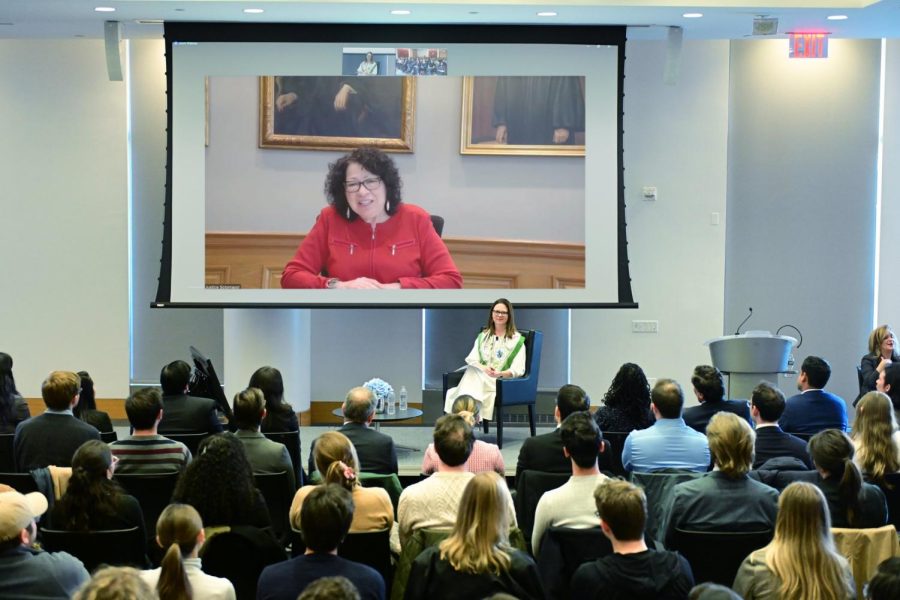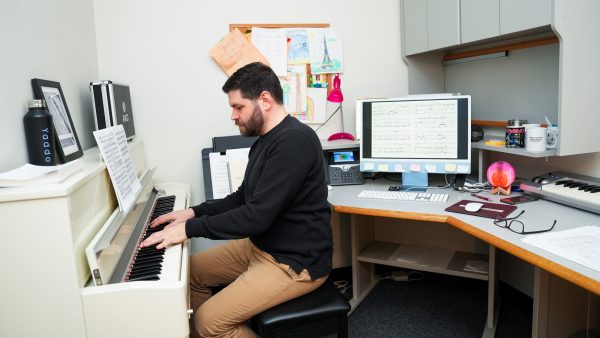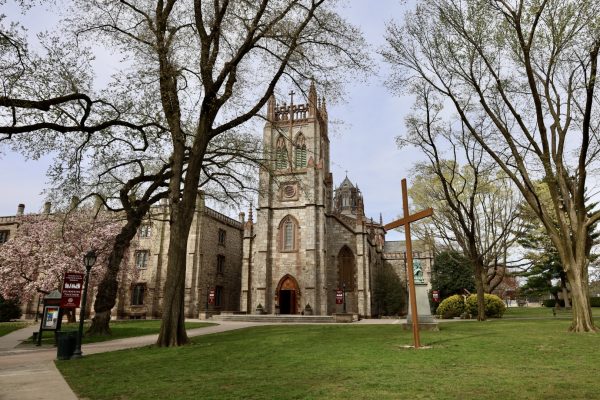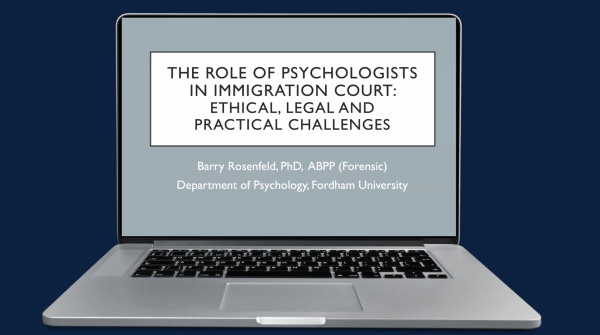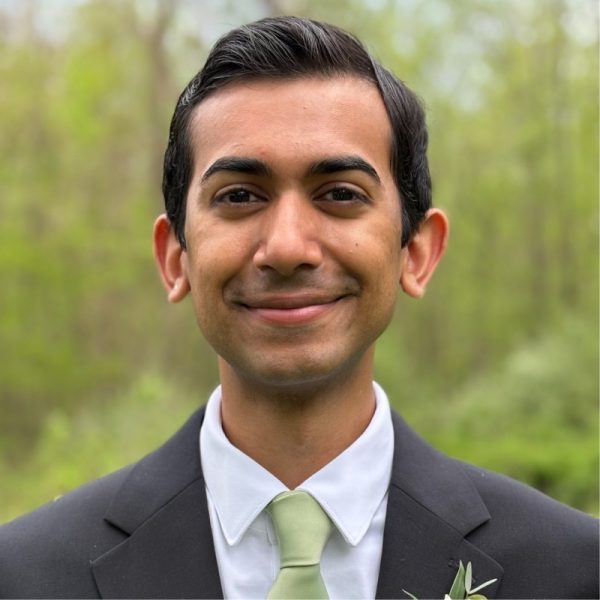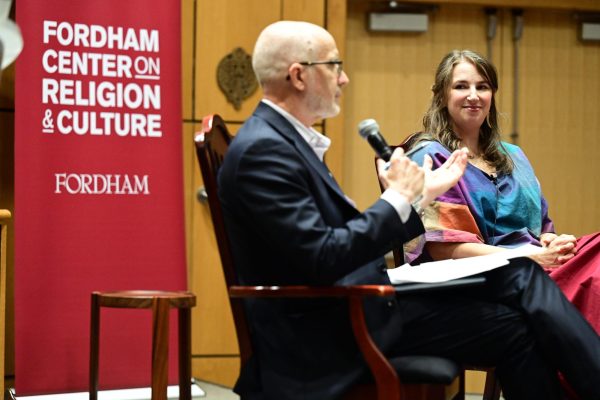Fordham Hosts Conversation with Justice Sotomayor
President Tania Tetlow hosted a conversation with Supreme Court Justice Sonia Sotomayor in Fordham University’s School of Law’s annual Robert L. Levine Distinguished Lecture Series on March 31, 2023.
Tetlow sat with students and faculty to facilitate the conversation while Sotomayor joined virtually.
Tetlow opened the conversation by asking Sotomayor how her experience growing up in the Bronx impacts her view of the law.
“The Bronx has shaped me in every important way,” said Sotomayor.
Sotomayor said growing up in public housing in the Bronx exposed her to different types of people, and she saw how they were all affected by the law. She said seeing the law’s effects on people in the Bronx became a part of her legal philosophy, meaning that she considers the human impact whenever she makes a ruling. Sotomayor also added that people have dubbed her “Sonia from the Bronx,” which she has embraced throughout her career.
Tetlow asked Sotomayor about her experience serving on all three levels of the judiciary: district court, circuit court and the Supreme Court. Sotomayor said that each level of the court system taught her something new. According to Sotomayor, in district court, parties are looking for justice. In the appeals court, facts are not usually contested, and the focus is on finding “justice for the law.” This contrasts with the Supreme Court, where decisions are often about finding the correct direction for laws. Sotomayor said that all these experiences shaped her to be the best judge possible.
Sotomayor also said she is often criticized for being “too focused on the facts” in cases. She said that this practice started when she was a trial lawyer, where she was taught to be a “common law judge.”
Tetlow then asked Sotomayor about the dissents she has been a part of lately. Sotomayor has recently been part of many dissenting opinions, including the high-profile case Dobbs v. Jackson Women’s Health Organization that effectively overturned Roe v. Wade.
Sotomayor responded that the most important part of writing anything, but especially a dissenting opinion, is to consider the audience and the reason for writing.
“What’s my purpose with this dissent [when] the majority has already spoken?” said Sotomayor on the importance of considering whether or not to write a dissenting opinion.
Sotomayor said sometimes her message is meant for lower court judges or agencies to explain why she believes they should change their minds. Sometimes, she said, they are meant to send a message to the public about specific legislation. Other times, she said that her sentiments are aimed at Congress. She cited Supreme Court Justice Ruth Bader Ginsburg’s famous dissent in Ledbetter v. Goodyear Tire & Rubber Co. regarding equal pay for women. Later, Congress passed the Lilly Ledbetter Fair Pay Act in light of her opinion. Lastly, Sotomayor added that sometimes writing dissenting opinions is important for the future and later interpretation of the law.
Next, the panel was opened for students to ask questions. Ashley Qamar, FSL ’23, president of the Latin American Law Students Association (LALSA), asked how Sotomayor balances being the only Latina voice on the court while not letting that aspect of her identity overshadow her qualifications.
“We are amalgams of our experiences,” said Sotomayor. She said that while being Latina is a big part of her, so are other aspects. She said being a Latina shapes her values, which play into her role as a judge. However, she said she always aims to see the law objectively.
“I had to come to my views on the law not as a Latina but as a lawyer or as a judge,” said Sotomayor.
Next, Sotomayor was asked about what qualities good litigators have. She said that all good litigators, regardless of what side of an issue they are on, have respect for everyone in the courtroom.
“Any advocate will win the respect of the court if their integrity is of the highest honor,” said Sotomayor.
Carlos Rico, FSL ’24, asked what Sotomayor believes is the biggest challenge facing the legal profession and practice in the next five years.
“I don’t know if any of the legal issues we see today will abate,” said Sotomayor.
She said that in the next five years, lawyers will have to continue to deal with uncertainty and that they will have to continue to act with honor. She said that while she believes that most lawyers are good people and that the profession is honorable, the “selling job” has been bad the last few years. She emphasized that the legal field has to continue to change the common perception of lawyers to maintain the public’s trust.
The last question came from Lauren Burgess, FSL ’23, seeking advice for young lawyers who feel “disillusioned” with the justice system.
“What choice do you have but to try and make it better?” said Sotomayor.
Sotomayor said that changing the system is the best way to handle disillusionment. She said lawmakers do not have “beautification from God” and can make mistakes, so it is up to lawyers and the legal system to correct them.
“People make laws. Justices are people. And people can get laws wrong,” said Sotomayor. “Wrong things can be changed and that’s what lawyers do.”
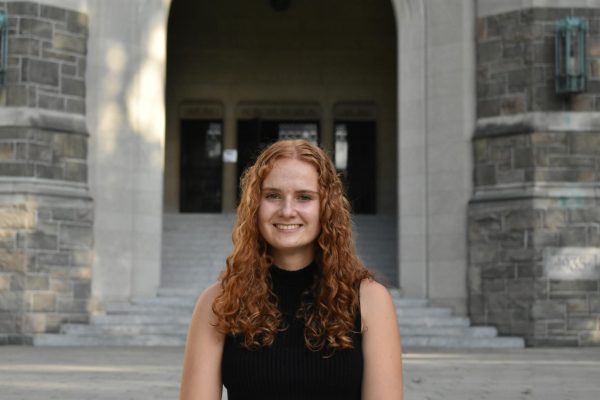
Isabel Danzis is a senior from Bethesda, Md. She is double majoring in journalism and digital technologies and emerging media. The Ram has been a very...





































































































































































































